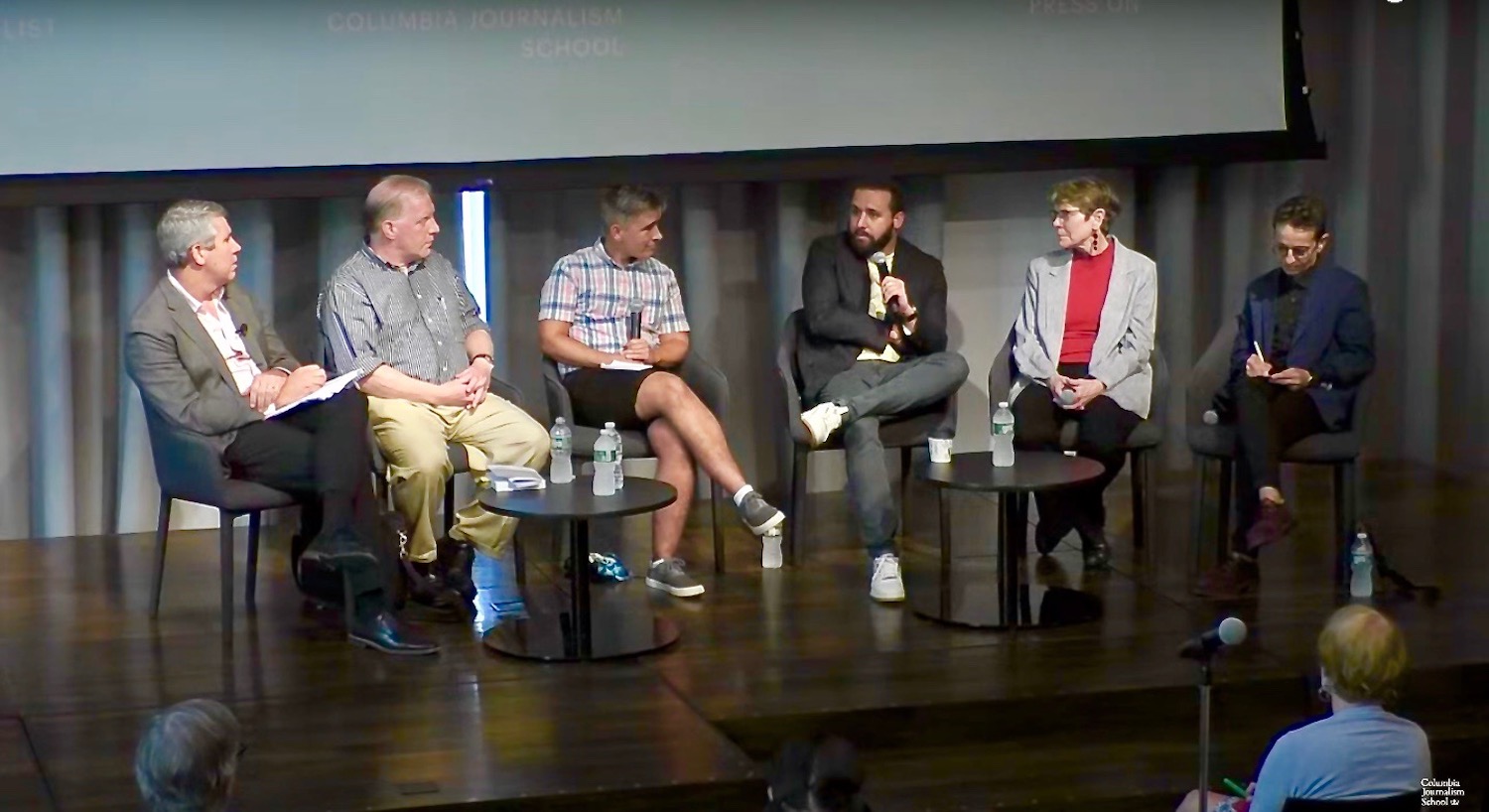Sign up for the daily CJR newsletter.
In an interview last fall, journalism scholar Jay Rosen referred to journalistic objectivity as the surface upon which enemies of the press wield their war against the truth. “Every time you are shown not to be behaving objectively, you are kind of in violation of your code, and you can be brought down because you’re not perfectly objective,” Rosen said. “And that’s a big attack surface, which the right wing has used very effectively to generate distrust in the news media.” As the right-wing war on the press has intensified, many journalists and scholars have continued to reevaluate the purpose and utility of objectivity in the newsroom.
On Tuesday, a group of journalists took up the matter at “The Objectivity Wars,” a panel discussion cohosted by Columbia University’s Ira A. Lipman Center for Journalism and Civil and Human Rights and CJR and moderated by Kyle Pope, CJR’s editor in chief. The discussion, which took place before a live audience at the Columbia Journalism School and was also streamed online, marks the school’s first public event under its new dean, Jelani Cobb.
Wesley Lowery, a former Washington Post reporter who has urged journalists to replace “the appearance of objectivity as the aspirational journalistic standard” with “being fair and telling the truth, as best as one can, based on the given context and available facts,” pointed out that most journalistic processes are inherently subjective. “What we know is that the act of journalism, no matter how much we fetishize the idea of objectivity, requires a series or pyramid of subjective decision-making,” Lowery said.
Several panelists noted that Donald Trump’s presidency had aggravated this fetishization tendency, generating an acute anxiety about objectivity in newsrooms. Throughout his presidency, journalists wrestled with the core tenets of objectivity, balance, and fairness, often suppressing their moral apprehensions toward the Trump administration in an effort to appear legitimate by virtue of neutrality. Commenting on the tepid coverage of Trump’s xenophobic tweets targeting four congresswomen in 2019, Lowery argued that a less rigidly objective press would’ve called Trump’s behavior out for what it was. “It was racist,” he said. “And yet most of our news organizations refused to describe it as such.”
This holding of the tongue that objectivity demands can be especially detrimental to journalists belonging to marginalized communities. “Objectivity, to me, has been a silencing force,” said Lewis Raven Wallace, a journalist who is transgender and whose book The View from Somewhere concerns objectivity’s detrimental impacts and details historical acts of journalism that reveal objectivity’s constraints.
Objectivity also works against meaningful diversity and inclusion efforts, Lowery and Wallace both noted, holding news organizations back from reshaping historically white power structures. Such newsrooms, Wallace argued, are “spaces of concentrated power and resources that white people run and make editorial decisions in,” and should embrace lessons on subjectivity from advocacy journalism and grassroots news organizations, bypassing the objectivity roadblock to instead work for and with marginalized and oppressed peoples.
David Greenberg, history and journalism professor at Rutgers University, pushed back on some of these ideas, arguing that objectivity standards within legacy news organizations are essential to the health of the overall media landscape. Greenberg envisions a future in which both traditional journalism and advocacy journalism continue to exist in tandem, with the former abiding by its historical notions of objectivity and the latter more freewheeling. “The strength of the American system over the past hundred years is that we’ve had both those models in play: legacy and advocacy,” he said.
A loss of objectivity within traditional news organizations, Greenberg suggested, could result in a loss in confidence in the press—a shift that Andie Tucher, professor at Columbia Journalism School, worried might also be a boon for bad-faith partisan media outlets or fake-news entities. Throughout the early twentieth century, Tucher noted, American journalism was rife with false, partisan information; objectivity became the standard in order to “stamp out” fake news. Without objective reporting to counteract the proliferation of fake news, Tucher suggested, that dynamic might be at risk of reversing. And if we can’t count on outlets like the Associated Press and Reuters for objective, albeit sterile, information, Greenberg asked at one point, then who can we count on?
But most people don’t count on legacy media anymore, Wallace pointed out. Trust in the media is at an all-time low. Objectivity simply isn’t getting the job done.
So what might be the solution?
“If we’re going to have an ideal, then moral clarity is a much better ideal for journalism than objectivity,” Masha Gessen, a writer for The New Yorker, said, referencing a guiding principle that Lowery has also suggested on numerous occasions.
Gessen appealed for a reconsideration of objectivity as a guiding principle in journalism, calling back to the muckrakers of the early twentieth century to reinforce the point. It’s not a coincidence that the most important journalistic work of that era was accomplished by utterly unobjective reporters from underrepresented communities; perhaps it’s time to return to our muckraking roots, Gessen implied.
“Ida Tarbell has a space in the journalism of our moment,” Gessen said. “Ida B. Wells has a space in the journalism of our moment.”
Has America ever needed a media defender more than now? Help us by joining CJR today.







